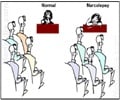Hypocretin (neuropeptide) increase may be a factor in opiate craving and raising the number of hypocretin cells to near normal levels could reverse narcoleptic symptoms.

‘Hypocretin (neuropeptide) increase may be a factor in opiate craving and raising the number of hypocretin cells to near normal levels could reverse narcoleptic symptoms.’





In 2000, UCLA researchers discovered that human narcolepsy is caused by a loss of roughly 90 percent of the 80,000 brain cells containing hypocretin, also called orexin, a chemical messenger, or neurotransmitter, important in the regulation of sleep. Narcolepsy causes excessive sleepiness, sleep paralysis (a feeling of being conscious but unable to move), hallucinations and episodes of cataplexy, a partial or total loss of muscle control that is often triggered by a strong emotion such as laughter. Narcolepsy affects about one in 2,000 to 3,000 people but can go undiagnosed for years, according to the National Sleep Foundation. The sleep disorder usually has its onset in childhood or adolescence.
In a new study, these researchers discovered that people addicted to heroin have, on average, 54 percent more hypocretin-producing neurons than do people without addiction. They confirmed, in mice, that opiates cause this increase. The increase in hypocretin cells lasted for as long as four weeks after discontinuation of the morphine treatment, well after morphine had left the animals' bodies.
The researchers hypothesized that morphine, the active ingredient in heroin, might restore the missing hypocretin-producing neurons in people with narcolepsy. To test this idea, researchers used mice that were made narcoleptic by the loss of hypocretin cells and gave them morphine. The researchers found that morphine increased the number of hypocretin producing cells and their narcoleptic symptoms disappeared.
Advertisement
Source-Eurekalert















